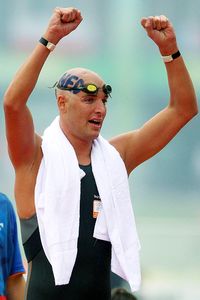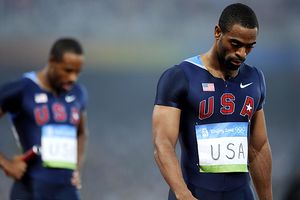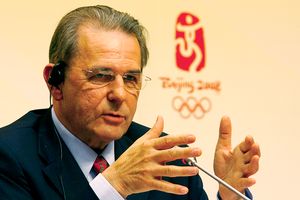Rob Smyth | blogs.guardian.co.uk/sport | August 29, 2008 11:05 AM
As this summer's transfer deadline approaches, look back at six of the most successful deals ever done
1) Diego Maradona (Barcelona to Napoli, £6.9m, 1984)
To associate the inspired transfer exclusively with the bargain is as restrictive as the inclination to associate beauty exclusively with the aesthetic. Just as heart-bursting beauty can be found by watching a bag blowing in the wind, so you can still sniff value even when paying through the nose.
As such, it feels apt that Maradona is the only footballer to break his own world-record transfer fee. Sometimes the most important thing is simply to identify the bleedin' obvious - true greatness, slap down some notes on the table and say, "Let's have some of this, then". That's what Napoli did in 1984. While Milan, Inter and Juventus faffed (Maradona was in a hurry to move as he was completely skint), they did the necessary.
Maradona had nothing to his name when he joined Napoli, but the champagne flowed over the next few years: he heads a select list of players (Alan Shearer is another) whose signing almost single-handedly brought unimaginable joy to a small or underachieving club. Napoli had finished a point off relegation the previous season.
Those corkscrew curls might occasionally have looked in need of some L'Oreal lovin', and there were issues with social dandruff as well, but there is no question that Maradona was in genuine "Because I'm worth it" territory.
2) Lee Dixon and Steve Bould (Stoke to Arsenal, £350,000 and £390,000, 1988)
Arsenal's legendary 1990s back five were so similar that it felt like they had emerged from the same sporting womb, when in fact they were adopted from all over the place to partner the club's natural child, Tony Adams. Even when Bould and Dixon were bought from second-division Stoke, it was at different times: Dixon in January 1988 and Bould in June.
In those days you could find a proper player in the lower divisions: if talent is concentrated strictly in a pyramid these days, back then it was more like Marge Simpson's hair, only squashed a bit at the top. A staggering number of players not only made the leap to the top, but looked comfortable straight away. Dixon and Bould were good enough to play 63 of 76 league games in Arsenal's championship victory in their first season. Imagine a team winning the title this year with Cardiff's Kevin McNaughton and Roger Johnson in their defence. Presactly.
But George Graham had obviously seen something - possibly two right hands going in the air and appealing for offside 50 times a game - and it was a remarkable achievement to compile such a formidable defensive unit from such disparate parts. There have been more famous and exciting double signings in English football (Ardiles/Villa and Mühren/Thijssen, mainly), but none as remorselessly effective. In signing them, Graham ensured bread would be on the table not for today or tomorrow, but for an entire decade.
3) Peter Shilton (Stoke City to Nottingham Forest, £250,000, 1977)
Peter Taylor made so many wonderful signings during his time in the Midlands: Ade Akinbiyi, Trevor Benjamin, Juni ... Let's try that one again.
Peter Taylor made so many wonderful signings during his time in the Midlands: Dave Mackay, Roy McFarland, Kenny Burns, Larry Lloyd, Frank Clark. But his best might have been the one so obvious that even Brian Clough, a notoriously modest judge of a player, knew it was a good deal. The key with signing Shilton, 27 and with nearly 400 league games already under his jockstrap, was not the player but the fee: a goalkeeper-record £250,000 for somebody whose role was so disparaged at the time it was a bit like paying £50,000 for a cleaner.
But Clough and Taylor knew the importance of bricks and mortar. They knew that Shilton was this close to being perfect. Seriously, if you are under 35, you have no idea of how magnificent this man was. This was the signing that Taylor, a goalkeeper himself, had waited his whole life to make, like a kid who had saved up his pocket money for years. In his autobiography he wrote: "I had been obsessed with him since he was 19 and already a fixture in Leicester City's first team."
Serendipity also came into it. Shilton's Stoke City, who were relegated the previous season as Forest were promoted, had their first game of the season away to Mansfield. The full horror of what lay ahead hit Shilton right between the eyes, and after a dose of the I'm-a-celebrity-get-me-out-of-heres he was off to Forest. In his first season they won the league; in the next two they were champions of Europe.
4) Sol Campbell (Tottenham to Arsenal, Bosman, 2001)
This article could have dealt solely with Arsène Wenger's signings and still omitted some gems; in English football, only Peter Taylor has had a keener eye for a player in the last 50 years. Yet for all the obscenely accomplished unknowns he has unearthed, Wenger's best signing, like Taylor's, might have been somebody we all knew intimately: Sol Campbell.
The deal wasn't quite the banker that it looks in hindsight. It's important to remember that Campbell was 26 and still a little erratic. And of course it took courage to strip Tottenham of their finest, however obvious the schadenfreudian trip. Yet Wenger saw in him the monster who would totally dominate the next few years at club and international level: astonishingly, in Campbell's first three seasons at Arsenal, they only lost one away game in the league when he was on the pitch (at Everton in 2002-03).
It's difficult enough replacing one great player - Kenny Dalglish famously managed it at Liverpool - but Campbell almost single-handedly replaced a great back four. Never mind Lauren, Keown and Cole: when Campbell was on one, as he frequently was in that period, Wenger could have played Lauren Laverne, Martin Amis and Ashley from Coronation Street and still kept a clean sheet. Without him, Wenger would have not won a league title for more than a decade.
5) Mickey Evans (Plymouth to Southampton, £750,000, 1997)
There is a flawed but potent discourse in football about strikers whose mid-season signing has cost their new side the title: Rodney Marsh, Tony Cascarino and Faustino Asprilla are the principal examples. At the other end of the table, there are loads of examples of forwards whose mid-season purchase has saved their new side from relegation. Kevin Campbell's nine goals in eight games at Everton in 1998-99 stand out, as does Christophe Dugarry's holiday romance at Birmingham in 2002-03, when he even made a silk purse out of Geoff Horsfield.
In the 1996-97 season, there were instances at three different clubs, starting with John Hartson and Paul Kitson at West Ham, and Darren Huckerby at Coventry. The other was the unknown striker Mickey Evans, picked up from Plymouth by Graeme Souness in March to help Southampton in their annual relegation dogfight. He did that and more: at the start of April, with Southampton bottom and five points away from safety, he scored four goals in as many games, including two in a massive win at Nottingham Forest. Evans became the most unlikely winner of the Premier League Player of the Month award (the silver medal goes to Alex Manninger). Those were the only league goals he scored for Southampton - Souness departed in the summer, and new manager Dave Jones didn't fancy him - but his place in history was secure.
6) Dwight Yorke (Aston Villa to Manchester United, £12.6m, 1998)
We all know Eric Cantona was Sir Alex Ferguson's greatest signing, but at £1.2m it wasn't that much of a risk. Signing Cantona's eventual replacement, Dwight Yorke, was a different matter; it took stones of granite. Partly because Ferguson was loosening the purse strings for the first time in nine years, and possibly the last if he got it wrong; partly because most observers, neutral and partisan, thought Yorke, scorer of a modest 73 goals in 232 league games for Villa, was hideously overpriced; but mainly because Ferguson had absolutely no support for the purchase within his own club.
Yorke had barely scored a goal against United (just one, a penalty) but the loose-limbed mischief of his performances against them had wowed Ferguson. Yet Ferguson's assistant, Brian Kidd, wanted John Hartson - no, you don't need to adjust your screen - and thought Yorke didn't have the "remarkable range of exceptional abilities", particularly dribbling, that so interested Ferguson. Staggeringly, most of the directors took Kidd's side, to the extent that Ferguson asked the board if they wanted to "call it a day". Having called their bluff, he got his man - and in his first season Yorke delivered 29 goals, more than 20 assists, the partnership from heaven with Andy Cole, the treble and a knighthood.





